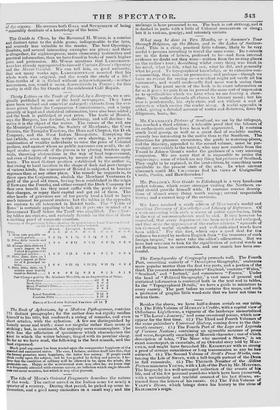The Book nf Aphorisms, by a Modern Pythagorean, contains 775
distinct paragraphs; for the author does not rigidly confine himself to his title, but confounds a string of remarks, and even short articles, with the aphorism. A few are distinguished by homely sense and truth ; some are singular rather than acute or striking ; but, in sentiment, the majority seem commonplace. The style has the affectation of quaintness which characterizes the knot to which the writer belongs, tinged with its peculiar slang. So far as we have read, the following is the best remark, and the best expressed.
Much good argument has been wasted upon the comparative happiness of de TOIrned and unmarried states. The case, I believe, resolves itself into this, that the former promises more happiness, the latter less misery. If people could think coolly upon the subject, nod be less guided by feeling and passion, I be- lieve that the condition of celibacy will be allowed to be, upon the whole, the preferable one. Happy as the matrimonial state may often be, we know that it is frequently attended with extreme misery, an infliction which single-blessed- ness can never occasion, but which it may often prevent.






















 Previous page
Previous page